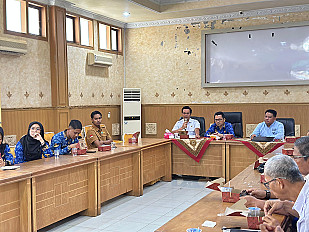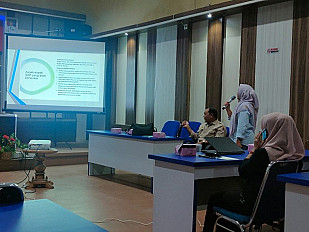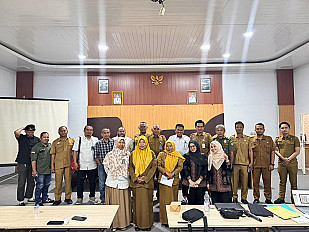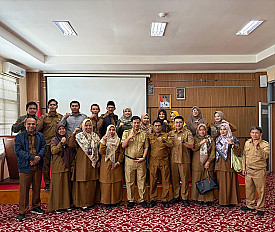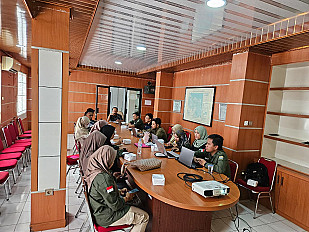News
445
Promoting CSR Synergy for Sustainable Development and Emission Reduction in Jambi Province
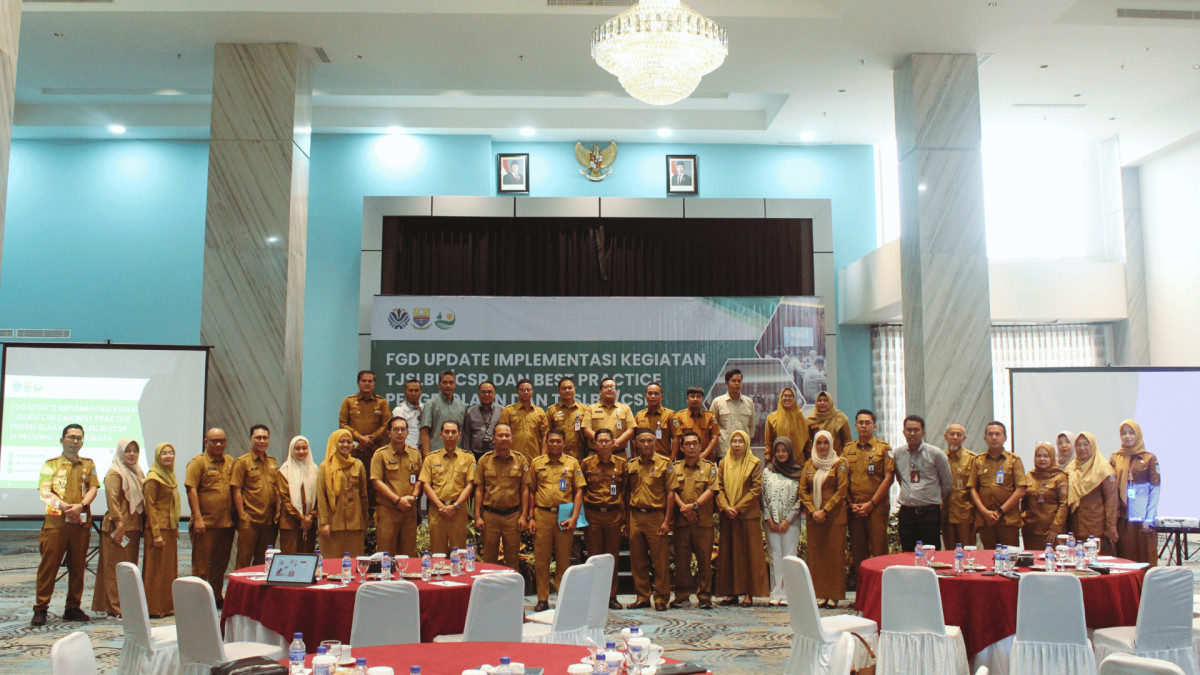
Portal BIOCF
Monday, 13 October 2025 Post 12:10 AM
Jambi, 13 October 2025 – The Jambi Provincial Government reaffirmed its commitment to strengthening the role of Corporate Social and Environmental Responsibility (CSR) as a crucial instrument for sustainable development and emissions reduction. Through activities facilitated by the Jambi Provincial Development Planning Agency (Bappeda), various stakeholders from the central, provincial, district/city, and private sectors gathered to align CSR program direction with regional development priorities.
In his remarks, the Secretary of the Jambi Provincial Development Planning Agency (Bappeda) highlighted the importance of increasing private sector participation in generating Emission Reduction (ER) within the BioCF ISFL program framework for 2025. Since entering the Pre-Investment phase in 2022, Jambi Province has allocated a budget of IDR 82.38 billion, with support from five key regional agencies: Bappeda, the TPHP Office, the Plantation Office, the Environmental Office, and the Forestry Office.
This meeting specifically discussed the implementation of the Community Service (TJSLBU)/CSR program that supports emission reduction and showcased best practices in CSR fund management in various regions. The main objective was to build synergy and synchronization between the government and businesses so that CSR becomes an integral part of regional development.
The Strategic Role of the Social Service and the Community Service Forum
The Head of the Jambi Province Social Service and Civil Registration Agency (Dukcapil), represented by the Head of the Social Empowerment Division, emphasized the Social Service's role in providing guidance, supervision, and capacity development for businesses in implementing Community Service (TJSLBU). Based on Ministerial Regulation Number 9 of 2020, every business entity is required to periodically report CSR activities to the government, with reports containing program information, budgets, and activity documentation.
In 2024, various initiatives implemented with CSR funding, such as road infrastructure improvements and the procurement of transportation for official operations, demonstrated the business sector's tangible contribution to regional development. The Jambi Province Community Service Forum is also developing a web-based system to strengthen its database and enhance the professionalism of its administrators until 2027.
Active Regency/City Involvement
A presentation from the Tanjung Jabung Barat Regency Development Planning Agency (Bappeda) revealed that the implementation of Corporate Social and Environmental Responsibility (TJSLP) has become part of the regional development strategy. Although not yet optimally coordinated, the local government has made various efforts to ensure more active and targeted corporate involvement. From the village development planning meeting (Musrenbangdes) to the proposal of priority programs, companies are directed to fund activities that cannot be covered by the regional budget (APBD).
The Tanjung Jabung Timur Regional Development Planning Agency (Bappeda) also emphasized the importance of synergy between CSR and regional programs. Their CSR policy, stipulated in Regional Regulation No. 13 of 2013, is geared toward addressing the real needs of the community, with a focus on strengthening the economy, socio-cultural environment, and developing village infrastructure.
Discussion: Challenges and Recommendations
The discussion forum revealed common challenges across various regencies/cities, particularly in reporting and coordination with companies. Several regions, such as Sarolangun and Batanghari, complained about a lack of reporting from business entities and low private sector awareness in supporting government programs.
In response, several strategies from other regions were outlined. Tanjung Jabung Barat Regency, for example, encourages intensive communication and provides annual awards to active companies as a token of appreciation. Meanwhile, in Tanjung Jabung Timur, direct communication between the regional head and company leaders is considered effective in increasing participation.
The Way Forward: Regulations and Standardization
As a follow-up, the Jambi Provincial Development Planning Agency (Bappeda) plans to draft a Governor's Regulation (Pergub) as a derivative of the Provincial CSR Regulation. This Regulation will regulate coordination mechanisms, the role of the facilitation team, and an integrated reporting system. Furthermore, the management of the Jambi Provincial CSR Forum will be overhauled to improve coordination effectiveness.
The Jambi Provincial Social Services Agency is also mandated to strengthen monitoring and evaluation of CSR implementation at the district/city level. Regional governments are also asked to adjust their regulations to align with national regulations, particularly Social Affairs Ministerial Regulation No. 9 of 2020.
2025 Focus: Social and Environmental Improvement
Jambi Province is committed to directing CSR funds to two main targets: reducing carbon emissions and improving social welfare. Twelve categories of community groups are prioritized as beneficiaries, ranging from vulnerable children, neglected elderly, people with disabilities, disaster victims, to the poor and remote indigenous communities.
CSR is no longer merely a corporate formality; it has become a strategic part of sustainable development. Through synergy between the government and businesses, Jambi Province hopes to realize inclusive, green, and sustainable development that favors the community and the environment.
Conclusion
This meeting serves as the initial step to unify perceptions and take concrete steps to integrate CSR into the regional development agenda. Cross-sectoral synergy and strong regulations are expected to make Jambi a model for successful and sustainable CSR implementation in Indonesia.
In his remarks, the Secretary of the Jambi Provincial Development Planning Agency (Bappeda) highlighted the importance of increasing private sector participation in generating Emission Reduction (ER) within the BioCF ISFL program framework for 2025. Since entering the Pre-Investment phase in 2022, Jambi Province has allocated a budget of IDR 82.38 billion, with support from five key regional agencies: Bappeda, the TPHP Office, the Plantation Office, the Environmental Office, and the Forestry Office.
This meeting specifically discussed the implementation of the Community Service (TJSLBU)/CSR program that supports emission reduction and showcased best practices in CSR fund management in various regions. The main objective was to build synergy and synchronization between the government and businesses so that CSR becomes an integral part of regional development.
The Strategic Role of the Social Service and the Community Service Forum
The Head of the Jambi Province Social Service and Civil Registration Agency (Dukcapil), represented by the Head of the Social Empowerment Division, emphasized the Social Service's role in providing guidance, supervision, and capacity development for businesses in implementing Community Service (TJSLBU). Based on Ministerial Regulation Number 9 of 2020, every business entity is required to periodically report CSR activities to the government, with reports containing program information, budgets, and activity documentation.
In 2024, various initiatives implemented with CSR funding, such as road infrastructure improvements and the procurement of transportation for official operations, demonstrated the business sector's tangible contribution to regional development. The Jambi Province Community Service Forum is also developing a web-based system to strengthen its database and enhance the professionalism of its administrators until 2027.
Active Regency/City Involvement
A presentation from the Tanjung Jabung Barat Regency Development Planning Agency (Bappeda) revealed that the implementation of Corporate Social and Environmental Responsibility (TJSLP) has become part of the regional development strategy. Although not yet optimally coordinated, the local government has made various efforts to ensure more active and targeted corporate involvement. From the village development planning meeting (Musrenbangdes) to the proposal of priority programs, companies are directed to fund activities that cannot be covered by the regional budget (APBD).
The Tanjung Jabung Timur Regional Development Planning Agency (Bappeda) also emphasized the importance of synergy between CSR and regional programs. Their CSR policy, stipulated in Regional Regulation No. 13 of 2013, is geared toward addressing the real needs of the community, with a focus on strengthening the economy, socio-cultural environment, and developing village infrastructure.
Discussion: Challenges and Recommendations
The discussion forum revealed common challenges across various regencies/cities, particularly in reporting and coordination with companies. Several regions, such as Sarolangun and Batanghari, complained about a lack of reporting from business entities and low private sector awareness in supporting government programs.
In response, several strategies from other regions were outlined. Tanjung Jabung Barat Regency, for example, encourages intensive communication and provides annual awards to active companies as a token of appreciation. Meanwhile, in Tanjung Jabung Timur, direct communication between the regional head and company leaders is considered effective in increasing participation.
The Way Forward: Regulations and Standardization
As a follow-up, the Jambi Provincial Development Planning Agency (Bappeda) plans to draft a Governor's Regulation (Pergub) as a derivative of the Provincial CSR Regulation. This Regulation will regulate coordination mechanisms, the role of the facilitation team, and an integrated reporting system. Furthermore, the management of the Jambi Provincial CSR Forum will be overhauled to improve coordination effectiveness.
The Jambi Provincial Social Services Agency is also mandated to strengthen monitoring and evaluation of CSR implementation at the district/city level. Regional governments are also asked to adjust their regulations to align with national regulations, particularly Social Affairs Ministerial Regulation No. 9 of 2020.
2025 Focus: Social and Environmental Improvement
Jambi Province is committed to directing CSR funds to two main targets: reducing carbon emissions and improving social welfare. Twelve categories of community groups are prioritized as beneficiaries, ranging from vulnerable children, neglected elderly, people with disabilities, disaster victims, to the poor and remote indigenous communities.
CSR is no longer merely a corporate formality; it has become a strategic part of sustainable development. Through synergy between the government and businesses, Jambi Province hopes to realize inclusive, green, and sustainable development that favors the community and the environment.
Conclusion
This meeting serves as the initial step to unify perceptions and take concrete steps to integrate CSR into the regional development agenda. Cross-sectoral synergy and strong regulations are expected to make Jambi a model for successful and sustainable CSR implementation in Indonesia.
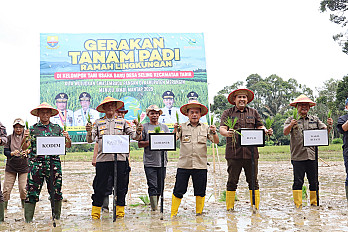
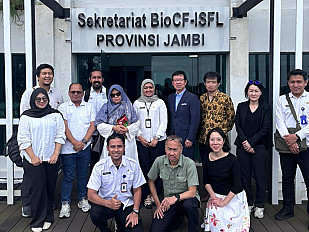
-thumb.jpg)
